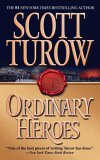Summary | Excerpt | Reading Guide | Reviews | Beyond the Book | Readalikes | Genres & Themes | Author Bio

And so this business of touching the things my father touched, of smelling his
Mennen talcum powder and Canoe aftershave, left me periodically swamped by
feelings of absence and longing. Handling his personal effects was an intimacy I
would never have dared if he were alive. I was in pain but deeply moved every
minute and wept freely, burbling in the rear corner of the closet in hopes my
mother wouldn't hear me. She herself was yet to shed a tear and undoubtedly
thought that kind of iron stoicism was more appropriate to a man of fifty-six.
With the clothing packed, I began looking through the pillar of cardboard boxes
I'd discovered in a dim corner. There was a remarkable collection of things
there, many marked by a sentimentality I always thought Dad locked. He'd kept
the schmaltzy valentines Sarah and I had made for him as grade-school art
projects, and the Kindle County championship medal he'd won in high school in
the backstroke. Dozens of packets of darkening Kodachromes reflected the life of
his young family. In the bottom box, I found memorabilia of World War II, a
sheaf of brittle papers, several red Nazi armbands taken, I imagined, as war
trophies, and a curled stack of two-by-two snaps, good little black-and-white
photos that must have been shot by someone else since my father was often the
subject, looking thin and taciturn. Finally, I came upon a bundle of letters
packed in an old candy tin to which a note was tied with a piece of green yarn
dulled by time. It was written in a precise hand and dated May 14, 1945.
Dear David,
I am returning to your family the letters you have sent while you have been
overseas. I suppose they may have some significance to you in the future.
Inasmuch as you are determined to no longer be a part of my life, I have to
accept that once time passes and my hurt diminishes, they will not mean anything
to me. I'm sure your father has let you know that I brought your ring back to
him last month.
For all of this, David, I can't make myself be angry at you for ending our
engagement. When I saw your father, he said that you were now being
court-martialed and actually face prison. I can hardly believe that about
someone like you, but I would never have believed that you would desert me
either. My father says men are known to go crazy during wartime. But I can't
wait any longer for you to come back to your senses.
When I cry at night, David—and I won't pretend for your sake that I don't—one
thing bothers me the most. I spent so many hours praying to God for Him to
deliver you safely; I begged Him to allow you to live, and if He was especially
kind, to let you come back whole. Now that the fighting there is over, I cannot
believe that my prayers were answered and that I was too foolish to ask that
when you returned, you would be coming home to me.
I wish you the best of luck in your present troubles.
Grace
This letter knocked me flat. Court-martialed! The last thing I could imagine of
my tirelessly proper father was being charged with a serious crime. And a
heartbreaker as well. I had never heard a word about any of these events. But
more even than surprise, across the arc of time, like light emitted by distant
stars decades ago, I felt pierced by this woman's pain. Somehow her
incomprehension alloyed itself with my own confusion and disappointment and
frustrated love, and instantly inspired a ferocious curiosity to find out what
had happened.
Dad's death had come while I was already gasping in one of life's waterfalls.
Late the year before, after
reaching fifty-five, I had retired early from the Kindle County Tribune,
my sole employer as an adult. It was time. I think I was regarded as an
excellent reporter—I had the prizes on the wall to prove it—but nobody
pretended, me least of all, that I had the focus or the way with people to
become an editor. By then, I'd been on the courthouse beat for close to two
decades. Given the eternal nature of human failings, I felt like a TV critic
assigned to watch nothing but reruns. After thirty-three years at the Trib,
my pension, combined with a generous buyout, was close to my salary, and my
collegiate cynicism about capitalism had somehow fed an uncanny knack in the
stock market. With our modest tastes, Nona and I wouldn't have to worry about
money. While I still had the energy, I wanted to indulge every journalist's
fantasy: I was going to write a book.
Excerpt from Ordinary Heroes by Scott Turow. Copyright 2005 by Scott Turow. Published by Farrar, Straus and Giroux, LLC in 2005. All rights reserved. Visitors to this web site are warned that this work is protected under copyright laws and reproduction is strictly prohibited. Permission to reproduce the material in any manner or medium must be secured from Farrar, Straus and Giroux, LLC.
These are not books, lumps of lifeless paper, but minds alive on the shelves
Click Here to find out who said this, as well as discovering other famous literary quotes!
Your guide toexceptional books
BookBrowse seeks out and recommends the best in contemporary fiction and nonfiction—books that not only engage and entertain but also deepen our understanding of ourselves and the world around us.